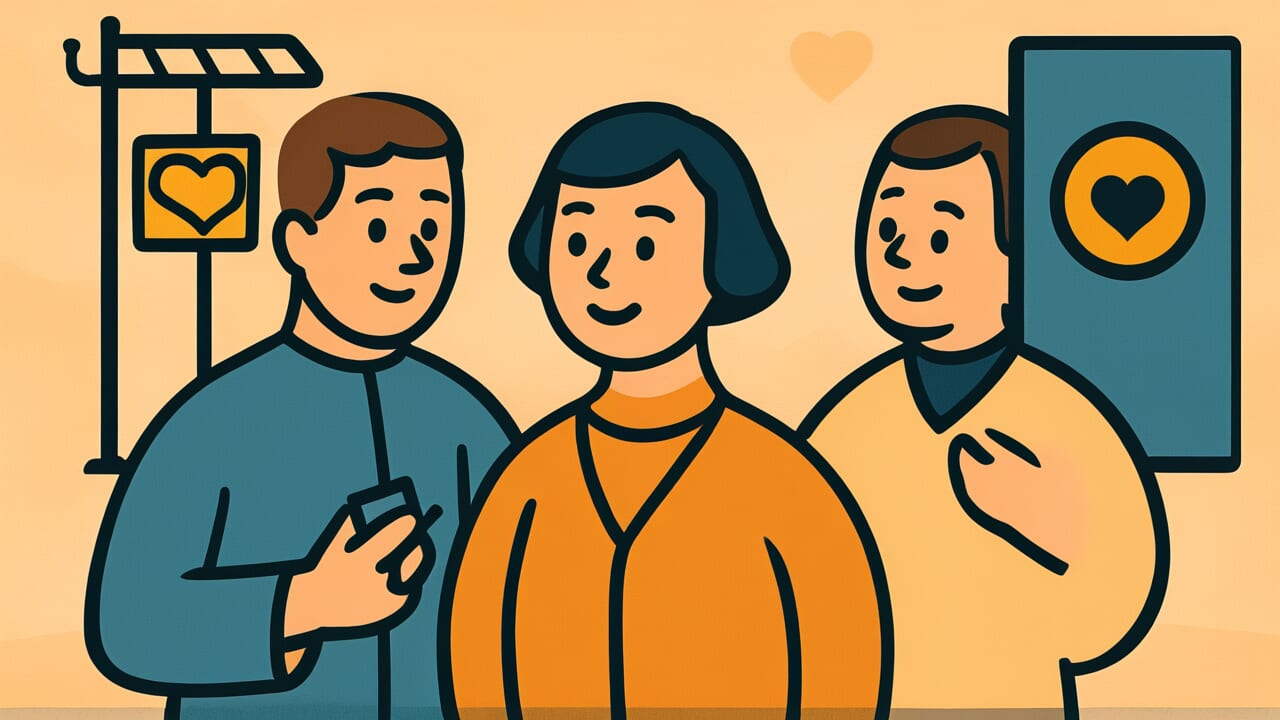How to Read “Love knows no barriers of high and low”
Koi ni jōge no hedate nashi
Meaning of “Love knows no barriers of high and low”
“Love knows no barriers of high and low” means that in romance, differences in social status, position, or standing don’t matter. No matter how high someone’s position is, or how low their status is considered to be, when they fall in love, their heart moves as one human being.
This proverb is used when love develops between people of different social classes. It’s also used when someone wants to give up on love because of differences in social standing. People also use it when talking about the fundamental equality of humans in romance.
Modern society no longer has a formal class system. But various forms of “high and low” still exist. These include differences in wealth, education, and occupation.
However, romantic feelings arise regardless of such social distinctions. When hearts are drawn to each other, the other person’s title or income isn’t the essential issue.
This proverb teaches us about the fundamental equality of humans in love.
Origin and Etymology
No clear written records remain about the exact origin of this proverb. However, we can make interesting observations from the structure of the phrase.
The expression “barriers of high and low” likely comes from the strict class system before the Edo period. The differences between samurai, townspeople, and farmers were clearly marked in every aspect of daily life.
Everything was determined by class. Where people lived, what they wore, even how they spoke. The “barriers” created by social status were absolute.
Yet human emotions, especially romantic feelings, had the power to transcend such social norms. Love between different classes created many tragedies. But at the same time, it demonstrated the fundamental equality of humans.
This proverb likely emerged from people’s observations of this social reality. No matter how strict the class system was, romantic feelings sprouted across class barriers.
People received this fact with both surprise and a kind of hope. Before the emotion called love, all people are equal. This truth was captured in these few words.
Usage Examples
- The company president’s daughter marrying a regular employee – that’s truly “Love knows no barriers of high and low”
- She’s a doctor and I’m a part-time worker, but I believe in “Love knows no barriers of high and low”
Universal Wisdom
The universal truth shown by “Love knows no barriers of high and low” is that humans have two aspects. We have a social face and an essential self.
We play roles in society every day. Boss, subordinate, senior, junior, rich person, poor person. These distinctions are necessary for society to function.
But the phenomenon of romantic love has the power to strip away all these social masks.
Why can love alone invalidate social distinctions so completely? It’s because romantic love is an emotion that wells up from the most primitive and instinctive part of humans.
People may be attracted to someone’s status or wealth. But true romantic feelings are born from resonance at a much deeper level. The other person’s smile, voice, gestures, way of thinking.
When your heart moves because of such personal characteristics, social standing becomes irrelevant.
This proverb has been passed down for so long because it proves the fundamental equality of humans. No matter how unequal society is, everyone returns to being the same human before the emotion called love.
This was both hope and comfort. The inequality created by society is not absolute. In our essential nature, we are all equal.
This is what the proverb quietly tells us.
When AI Hears This
When we observe the brain during romantic love, we find surprising discoveries. When someone earning $100,000 and someone earning $30,000 fall in love, the chemical reactions in their brains are almost identical.
Dopamine secretion levels, oxytocin concentration, decreased prefrontal cortex activity patterns – none of these change based on social status. In other words, love is the only “completely democratic experience” that humans have.
What’s even more interesting is that prefrontal cortex activity is suppressed during romantic love. The prefrontal cortex controls judgment and calculation. Normally it makes social evaluations like “this person is above my station” or “we’re not economically compatible.”
But when people fall in love, this function decreases by about 30 percent, according to brain imaging research. In other words, love physically turns off the brain’s “class sensor.”
Reward system research has also revealed something fascinating. The nucleus accumbens response when viewing a lover’s photo has the same intensity as when receiving monetary rewards.
But there’s a crucial difference. Response to monetary rewards varies by amount. But romantic love rewards aren’t affected by the partner’s social status. To the brain, every loved one is processed as “the maximum reward.”
This neuroscientific fact biologically proves why love is fundamentally equal.
Lessons for Today
What this proverb teaches modern people is the diversity of standards for evaluating others. In modern society, we’re flooded with measuring sticks for people. Education, income, occupation, social media followers.
We may have become too accustomed to judging people by such standards.
But “Love knows no barriers of high and low” gives us a different perspective. A person’s value cannot be measured by social status alone.
When you’re genuinely attracted to someone, what you’re seeing isn’t their title. You’re seeing the person themselves. Isn’t that sense the essential way to see people?
This isn’t limited to romantic relationships. In friendships and work relationships too, it’s important not to judge others only by their social position. We should face them as individual human beings.
When you remove the tinted glasses of status and titles, you can see things for the first time.
Do you check someone’s title first when you meet them? This proverb gives us a chance to reconsider such habits.
It reminds us that the essential value of humans exists somewhere separate from the hierarchy society assigns.



Comments